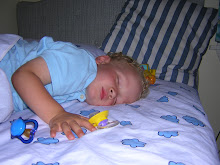Good question. And, since we know everything, we will attempt to answer it and will follow with a little about one of Denise's recent patients.
If your child is overweight, his or her lungs can't move as well in the chest. That's because the big belly is pushing up against the diaphragm and the diaphragm needs to be able to move up and down to pull air into the lungs. The other thing that happens is that there is extra *stuff* (the technical term is "tissue") in the back of the throat, at the entrance to the pipe that goes to the lungs. So, during sleep, the number of times that you breathe in a minute decreases PLUS the diaphragm is having trouble moving down because it's being pushed up by belly fat PLUS there's extra stuff in the back of the throat. Not good. But wait, there's more! During dream sleep, all of the voluntary muscles in the body are paralyzed; the diaphragm is not a voluntary muscle, but all of the muscles in the ribcage and neck are and so they can't help the diaphragm out. So, now, there's lots of extra stuff flapping around in the back of the throat, the diaphragm is compressed by the belly fat, and there's NO ONE AROUND TO HELP. This makes for a BAD SCENE. BTW, the stuff flapping around in the back of the throat usually makes a noise, for which the technical term is SNORING. Write that down. (just kidding.)
So, in the pediatric sleep lab at the World's Greatest pediatric hospital, we see lots of overweight kids who snore. And sometimes we can get a little lazy (especially since we know everything) when we see an overweight kid come in and we want to leap to the conclusion that the patient has obstructive sleep apnea. And, a lot of the time, we would be right.
However, as Denise discovered the other night, there is a reason that we get paid the big bucks to stay awake all night long watching our little angels sleep: sometimes the overweight kids don't have sleep apnea and are tired in the daytime or have disturbed sleep patterns for another reason.
Denise's patient was 3 years old, about 36 inches and 80 (EIGHTY) pounds. In kids, a general rule of thumb for the first 6 years or so, is one pound per inch, so we see lots and lots of cute toddlers who are 36 inches tall and weigh 36 pounds or 5 year-olds who are 48 inches tall and weigh 50 pounds or so. This child's (can I say Butterball?) BMI was 43, well into the obesity arena. While talking to the patient's mom, Denise found out that the 3 year-old was still getting a bottle at night. Bad enough, but wait, there's more! When our beloved little Butterball awakened in the night, she was given MORE MILK. So, she was drinking about 24-32 ounces of WHOLE MILK at night, every night. Denise asked Butterball's mom why she wasn't given water and mom said it was because Butterball liked milk. Well, we like martinis, but we know not to drink 24 ounces worth of them after bedtime (that's what cocktail hour is for.)
So, Denise convinced Mom of Butterball to forgo milk for the night and to just give her water if she was thirsty. And, lo and behold, once our beautiful BB got some water, she didn't ask for another bottle, slept through the entire night and DIDN'T HAVE SLEEP APNEA.
The moral of the story? Damned if I know. HOWEVER, if your child gets up frequently during the night, remember to revisit what you're doing to get the little darling back to sleep or you could be conditioning your sweetiepie to demand something that, while okay as an infant, isn't okay as a child or toddler or college freshman.
And if you want to wake Trixie with a martini, please remember the olives.
Songs of Innocence & Experience
6 years ago




No comments:
Post a Comment